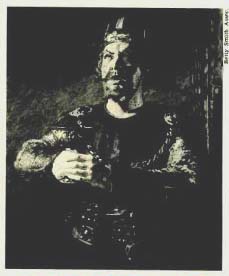A little ceremony and a lot of sentiment.
by WILLIAM LIVINGSTONE

THE animosity that existed between Rudolf Bing and the late Wagnerian tenor Lauritz Melchior is well known even to opera fans too young to have heard Melchior at the Metropolitan Op era. When Bing became general manager of the Met in 1950, he did not renew the contract of the Danish singer many consider to have been the greatest heroic tenor of this century, if not of all time.
Melchior never returned to the Met, not even to attend a performance.
Bing left the Met at the end of the 1971-1972 season, and in a sense Melchior has now returned, for when he died March 18, 1973), he left the company a portrait of himself as Tristan, the role he had sung most often there. The portrait, painted by Nikol Schattenstein in 1937, was gratefully accepted by the current management, and in March of this year it was hung in the opera-house gallery, a permanent exhibit of portraits of operatic composers and past members of the company-great singers, conductors, and general managers (the collection lso contains a bust of Bing).
Appropriately, Melchior's portrait was hung beside that of Kirsten Flagstad, he Norwegian soprano with whom he frequently sang, and when it was unveiled, the board of directors of the Metropolitan held a small reception for its first public showing. Langdon Van Norden, vice chairman of the board, made a brief address accepting the painting from Melchior's estate, along with he sword, horn, and ring he used in Siegfried and Gotterdammerung.
Francis Robinson, assistant manager of the Met, also spoke, outlining Melchior's career. The singer was born March 20, 1890, in Copenhagen and made his operatic debut in that city in 1913 as a baritone. After further study, he made his tenor debut in 1918. He made his first appearance at the Met in 1926, as Tannhauser, and remained with the company for twenty-four seasons.
Although he sang and recorded the work of other composers (see review else where in this issue), Melchior was primarily an interpreter of Wagner. In all he sang 971 performances of seven Wagner operas, 476 of them with the Met.
After citing the encomiums heaped on Melchior during his career, Mr. Robin son, an accomplished raconteur, illustrated the human side of the artist with a few anecdotes. Melchior was notorious for his rhythmic inconsistency, and when he made his Covent Garden debut, the conductor Bruno Walter said, "All right, Melchior, my left hand is exclusively yours. When I wave like this, start singing, and when I wave like that, stop." Fritz Stiedry, who conducted him often at the Met, was quoted as having said, "He may be inconsistent in rhythm, but he's consistent in other ways: once he learns a mistake, he never forgets it!" Mr. Robinson pointed out that Melchior received poor reviews at his Met debut, but his co-star, Maria Jeritza, was highly praised. He then introduced Mme. Jeritza and a number of Melchior's other colleagues who were present for the ceremonies, including Bidu Sayao, Alexander Kipnis, and Osie Hawkins, who is now executive stage manager at the Metropolitan. There was a touching moment when Mme. Jeritza, the Met's first Turandot, embraced Anna Case, who sang Sophie in the Met's first Rosenkavalier in 1913. Both ladies are well into their eighties, and both still go to the opera regularly.
MELCHIOR never lost his interest in opera either, and for a long time after leaving the Met, he continued to sing in concerts and films and on records. On his seventieth birthday he sang a performance of Die Walkure with the Danish State Radio Orchestra. And in 1968 he organized the Heldentenor Foundation to assist young tenors preparing for operatic careers.
He never concealed the bitterness he felt over the abrupt termination of his Metropolitan career and the fact that throughout Bing's long regime he was not invited to a single performance. The last months of his life were brightened, however, by a gracious invitation from the Met's present general manager, Schuyler Chapin, who wrote to Melchior at the beginning of the 1972-1973 season and asked if the tenor would be his guest at a forthcoming Wagnerian performance. Melchior was deeply moved, but he had already suffered a stroke and did not recover sufficiently to accept the invitation. In any case, the breach was finally healed, and now, spiritually at least, the Heldentenor has come home.
----------
Also see:
GOING ON RECORD by JAMES GOODFRIEND